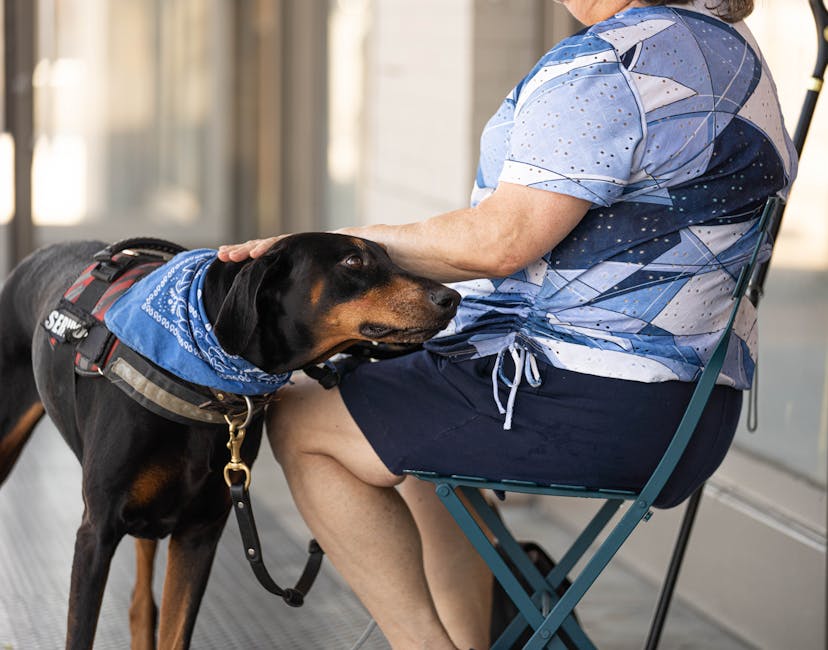Aging pets, like their human counterparts, experience physical and emotional changes as they progress through life. While these changes can be challenging, numerous resources are available to help ensure comfort and quality of life for senior animals. This article delves into the diverse support systems available, from veterinary care to at-home assistance and community programs.
Understanding the Needs of Senior Pets
Senior pets, typically defined as animals over seven years old, often exhibit noticeable shifts in behavior and health. Their metabolism slows, making them more susceptible to certain illnesses. Joint pain, vision impairment, hearing loss, and cognitive decline are common occurrences. Additionally, senior pets may experience changes in appetite, energy levels, and sleeping patterns. Recognizing these changes is crucial for providing appropriate care.
Veterinary Guidance: A Cornerstone of Senior Care
Veterinary care is paramount in supporting a senior pet’s well-being. Regular check-ups become even more significant, allowing veterinarians to monitor health parameters, detect early signs of illness, and adjust treatment plans as needed. Senior pets may require specialized diets, pain management strategies, or specific medications to address age-related conditions. A proactive approach ensures a comfortable and healthy aging process.
Crucially, a comprehensive senior pet health assessment is critical. Bloodwork, urine tests, and imaging techniques are often necessary to identify underlying issues before they significantly impact the pet’s quality of life. Veterinarians are well-equipped to offer guidance on mobility aids, such as ramps or harnesses, when necessary.
Beyond the Clinic: Holistic Approaches to Senior Care
A senior pet’s needs extend beyond veterinary visits. A compassionate approach focuses on comfort, enrichment, and safety.
Nutrition plays a vital role. Specialized senior dog and cat foods often contain essential nutrients and are formulated to meet the particular dietary requirements of aging animals. Adjustments to a pet’s routine are also essential. Gentle exercise, tailored to their limitations, can maintain muscle mass and support joint health.
Environmental modifications can significantly enhance a senior pet’s comfort level. A senior pet might require a more cushioned bedding area, a softer food bowl, or ramps to access elevated areas. A safe and familiar environment is crucial, reducing stress and anxiety.
Addressing Behavioral Changes
Recognizing changes in behavior, like increased anxiety, sleep disturbances, or changes in appetite, is essential. These adjustments in behavior often stem from underlying health issues or discomfort. Consulting a veterinarian about behavioral modifications can be invaluable. Therapies, such as aromatherapy, can also create a calming environment.
Supportive Communities and Services
Many resources extend beyond the veterinarian’s office. Animal shelters and rescue organizations often offer support for senior pets, providing crucial aid to those in need of adoption or fostering. Support groups, facilitated by veterinarians or animal behaviorists, can connect pet owners with others experiencing similar challenges.
Online forums and social media groups dedicated to senior pets offer a valuable network for information sharing and emotional support. These platforms allow owners to connect with others, share experiences, and receive advice from experts and fellow pet parents. Information on senior pet care and resources are becoming increasingly accessible in this way.
Financial Considerations and Caregivers
The cost of senior pet care can be significant. Fortunately, there are financial assistance programs available for pet owners facing hardships. These programs might offer discounted services or provide grants for veterinary care or specialized diets. If owners are unable to fully manage a senior pet’s needs, senior care facilities or home care services can be considered. Caregivers can access resources to help with bathing, feeding, and administering medication.
Community Programs and Initiatives
Many communities recognize the need for senior pet care and have implemented programs to support them. These programs might include senior pet adoption events, fundraising campaigns, or awareness initiatives. Local shelters or rescue organizations frequently organize adoption days or temporary fostering programs. Supporting these initiatives aids the senior pet population as a whole.
Looking Ahead: Long-Term Care Strategies
Long-term care strategies for senior pets are essential. Establishing a plan to manage their well-being as they continue to age is crucial. This includes ensuring access to routine veterinary care, appropriate nutrition, and environmental adjustments. A contingency plan for potential future needs, such as assisted feeding or mobility support, should be in place.
Conclusion: A Comprehensive Approach
Providing exceptional senior pet care requires a holistic approach. It involves understanding the unique needs of aging animals, implementing proactive veterinary care, addressing behavioral changes, and leveraging available support systems. A combination of these elements contributes to maintaining a high quality of life and ensuring a happy and comfortable senior pet experience. Through comprehensive support and understanding, we can embrace the joy and companionship of our aging animal friends.
